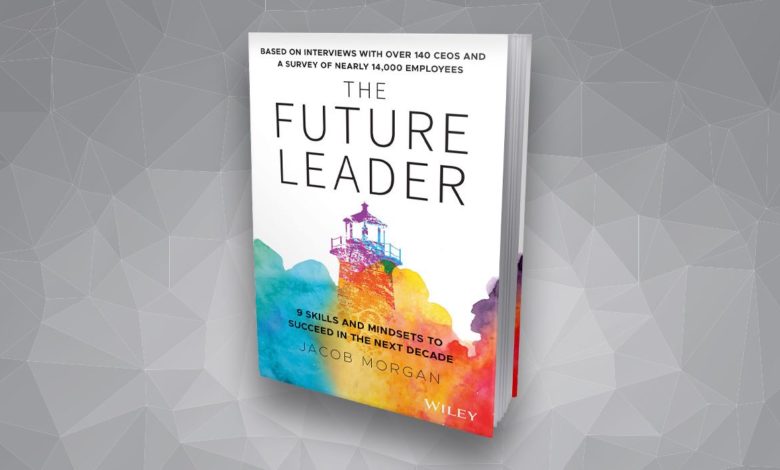
From Barack and Michelle Obamas’ Oscar-winning documentary, “American Factory,” to Ivanka Trump’s keynote speech at CES 2020 titled, “The Path to the Future of Work,” influential leaders on both sides of the political spectrum are focusing on the future of work and reskilling the workforce. It’s vital to stay on top of these transformations as technology changes our lives and working environments at unprecedented rates. But what should leadership look like in these ever-changing times? As our workplaces delve into unchartered waters, who do we want to captain this ship?
Four-time best-selling author Jacob Morgan strives to answer this question in his upcoming book, The Future Leader. Aptly featuring a lighthouse on the cover, it is scheduled to be released on 26 Feb., and will be available in both print and digital formats. However, I was able to get my hands on an early copy of the manuscript, and I believe it may end up being the The 7 Habits of Highly Effective People of the next generation.
In case you haven’t yet heard of him, Jacob Morgan is renowned for his expertise on leadership, the employee experience, and the future of work. In addition to his extensive writing on these topics, Morgan hosts this podcast, gave this TED Talk titled “How to Future Proof Your Career,” and annually speaks at approximately forty conferences around the world.
In creating this latest book, Morgan details the skills and mindsets that he predicts will be crucial for future leaders. This assessment is based on interviews with 140 CEOs representing “over 7 million people, 35 industries, and 20 countries around the world.” In addition, he partnered with LinkedIn “to survey almost 14,000 of their members around the world who self-identified as full-time employees to see if their perceptions lined up with what CEOs were saying.” The results may be the largest, most comprehensive research study on the current state of leadership, and after analyzing this data, he proposes what the future of leadership should entail.
This analysis revealed several trends among employees, but there is one I found particularly intriguing. Employees don’t want to just work for an effective leader – they want to work for a good leader. For example, dictators can be very effective leaders. They can have clear objectives and can be proficient at achieving these objectives. They often have a dedicated, cult-like followers who enable them to achieve many of their goals. However, are they good? For most of us, the answer is a resounding no.
And while I certainly hope your employer isn’t a full-fledged dictator, Morgan points out that even being a typical, business-driven employer is not enough to inspire loyalty from employees anymore. Although in the previous decade or two, leadership was measured more strictly based on business acumen and achievement of specific goals (like growth of stock prices), in more recent times, employees seek a more humanitarian-centered leader and want to work under CEOs who seek to improve the employee experience.
In a world where our personal lives are no longer private (thank you, social media, and our love/hate relationship with it), being effective is no longer enough. Employees want employers that they can holistically respect for their sense of purpose and how well they treat others; not just their business achievements.
This emphasis on sense of purpose and the desire to have an impact is also shaping the way employees view their employment. I found the studies Morgan cited on employee satisfaction interesting as well. In The Future Leader, he states, “In Deloitte’s most recent Millennial Survey which collected 10,000 responses from 36 countries, 71% of millennials said they are expecting to leave their employer in the next two years because they are unhappy with how their leadership skills are being developed.” Also, the seminal Gallup study on global engagement found that “only 15% of employees around the world are engaged in their jobs.” In the past, life outside the cubicle wasn’t a focus for employers and having purpose and impact at work was laughable. However, if employers want to see a rise in employee retention, this lack of employee engagement needs to be addressed.
One of the first steps of this process involves assessing the state of leadership at a business; not just among those in the C-suite but for all employees. Morgan says that, “The worst thing you and your organization can do is not have a clear definition of what leadership is and what it means to be a leader. Even if you’re not sure if your leadership definition is perfect, you have to start somewhere and then improve.” In workplaces that don’t define and discuss leadership, employees are experiencing a lack of growth and engagement. Defining leadership, discussing leadership opportunities, and showing the value of following good leadership can help businesses cultivate the meaningful employee experience that so many companies and employees alike are seeking.
With the increasing automation of jobs in so many industries, many are wondering how to prepare for the rough waters ahead. Morgan’s focus on leadership presents a fresh and compelling take on the topic with his list of four mindsets and five skills of the future leader acting as the north star to guide us. The time has come for these new leaders to take the helm.
Opinions expressed in this review are those of the author and not necessarily those of IEEE or IEEE-USA. The author did not receive any compensation or incentive from Jacob Morgan or The Future Organization to write this review.
Jacquelyn Adams, an IEEE Senior member, is a nationally-recognized leader in employee learning and development. Jacquelyn is the CEO and Founder of Ristole, a consulting business that transforms corporations through engaging employee training. Find more of her Lessons on Leadership columns here.






